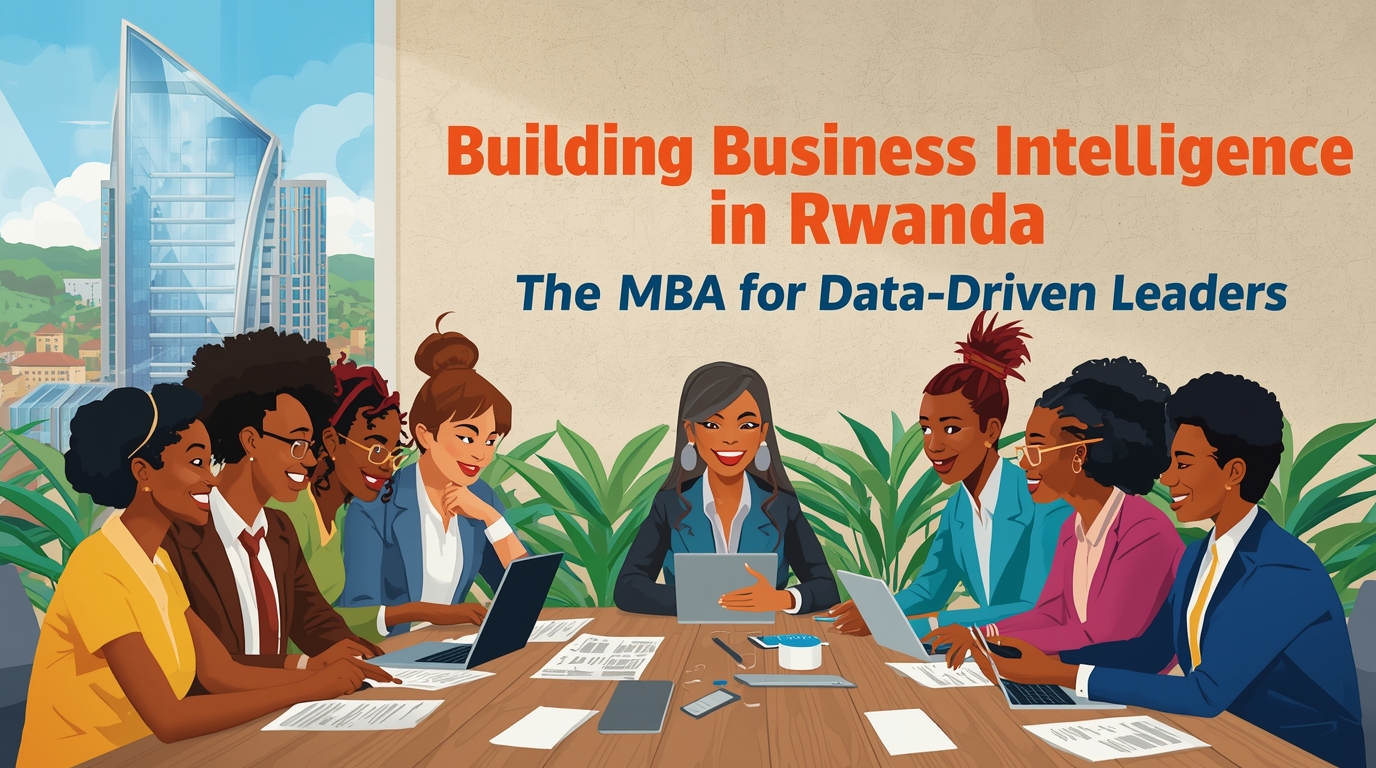I remember sitting in a boardroom in Lusaka a few years ago. The company was solid, the team was great, and we were hitting our targets. On paper, everything was perfect. But we were discussing the five-year plan, and the conversation felt… small. We were talking about incremental improvements, about doing the same things we were already doing, just a little bit better.
I looked out of the window at the skyline, at the cranes and the new buildings going up, and felt this huge disconnect. The world outside, the Zambia outside, was changing at a dizzying pace. New technologies, new markets, new challenges. And here we were, polishing yesterday’s solutions. I had this sinking feeling that we weren’t just managing a business; we were managing a museum piece.
It wasn’t a question of being stuck. It was a question of vision. And I realised, with a bit of a shock, that while I was a good manager, I wasn’t yet a visionary.
It’s a tough realisation to have, isn’t it? To be at the top of your game, respected and successful, but to feel that there’s a whole other level you can’t quite reach. It’s the moment you stop asking, “How can I do my job better?” and start asking, “How can I change the game completely?”
That’s often when the idea of a doctorate, a Doctor of Business Administration (DBA), starts to whisper at the back of your mind.
The Expert Guide’s Dilemma
Think of your career up to this point like being an expert safari guide. You know the terrain of your industry like the back of your hand. You know every landmark, every waterhole, every predictable migration pattern of the market. An MBA is what makes you the best guide in the business. It gives you the best vehicle, the best maps, and the best binoculars. You can give your clients—your company—a fantastic, reliable, and successful tour every single time.
But what happens when the landscape itself begins to change? What happens when a new river cuts through the savanna, when the climate shifts and the old waterholes dry up? What happens when your perfect, laminated maps are no longer accurate?
This is the expert guide’s dilemma. Being the best at navigating the old world is no longer enough. You need to develop the skills to read the land itself, to understand the deeper ecosystem, and to chart a new path where no map exists.
This is the difference between a manager and a visionary. And this is the transformation a DBA is designed to ignite.
The DBA: From Following the Map to Drawing It
Let’s be clear. A DBA isn’t just an “MBA Plus”. It’s a completely different kind of journey.
An MBA teaches you to master the existing maps. It gives you the frameworks and best practices to navigate the known business world with absolute confidence.
A DBA, on the other hand, teaches you to be a cartographer. It teaches you how to study the landscape, understand the underlying geology, and draw a new map for others to follow. You take a real, complex, and often uniquely Zambian business problem—how to build a sustainable supply chain in the Copperbelt, how to leverage fintech to reach the unbanked, how to lead a digital transformation in the agricultural sector—and you use rigorous research to create new knowledge, a new solution.
You stop being a consumer of business theory and become a creator of it. You’re not just solving a problem for your company; you are contributing a solution that can elevate your entire industry. It is the ultimate act of professional leadership.
Can You Afford the Expedition?
The moment you contemplate an expedition this grand, the practicalities hit you like a tonne of bricks. The time commitment seems impossible for a senior professional. The cost can feel astronomical when you have family responsibilities and a life in Zambia to fund. And that quiet, persistent fear – am I truly smart enough for this? – can be the biggest barrier of all.
But let’s reframe that. A DBA isn’t about having the highest IQ. It’s about having the deepest curiosity. It’s for the person who sees that unsolved problem and can’t let it go. It’s for the leader who isn’t satisfied with just managing the present but feels a deep responsibility to build the future. Your ambition isn’t a sign you’re dreaming too big; it’s the sign that you’re ready for the journey.
So, the real question becomes: is there a way to embark on this expedition without abandoning your life and your career in Zambia?
Charting Your New Path with American Imperial University
In the past, a doctorate meant relocating your entire life to another continent for several years. For a Zambian professional with deep roots, a career, and a commitment to being part of our nation’s growth, that’s simply not a viable option.
This is what makes the structure of the American Imperial University DBA programme so revolutionary. It’s an expedition you can undertake from right where you are.
Your Research Basecamp is Home The flexible, online nature of the AIU DBA means you don’t have to leave. Your basecamp is your home office in Lusaka, Kitwe, or Ndola. You can continue to lead your team, drive your company forward, and be present with your family, all while undertaking this profound intellectual journey. You fit the research and study into the rhythm of your own life, not the rigid timetable of a foreign university.
A Global Team of Guides You’re not on this journey alone. The programme connects you with a global network. Your supervisors are world-class academics and practitioners who guide your research. Your fellow candidates are other senior professionals from across the globe, all charting their own new maps. Imagine the power of discussing your research on sustainable mining with an expert in Australia, or your fintech model with a peer in Singapore, all from your study at home. You gain global insights to solve local challenges.
An Investment, Not Just a Cost Let’s talk about the Kwacha. A doctorate is a major financial commitment. But the online model makes it far more accessible. Without the huge overheads of a physical campus, AIU can offer this elite qualification at a much more manageable cost. When you consider that you’ll continue to earn your salary, it shifts from an overwhelming expense to a strategic, high-return investment in your future and the future of your organisation.
Are You Ready to Draw the Map?
This journey isn’t for everyone. If you are happy and challenged being the best safari guide in the business, that is a fantastic and valuable career.
But if you’re the one who keeps staring at the horizon, wondering what lies beyond the edge of the current map… If you see the challenges facing our industries here in Zambia not as threats, but as opportunities to create something new… If you feel that pull to move from managing what is to building what could be…
Then a DBA might be the path you’ve been looking for.
You don’t have to pack your bags and set off today. The greatest expeditions start with a single, small step. Start by simply looking at the map. Have a look at the DBA programme at American Imperial University. See the kind of research people are doing. Read about the faculty.
It’s a quiet act of exploration. A moment of curiosity. But it might just be the first step on your journey from manager to visionary.
Frequently Asked Questions
1. I already have an MBA. How is a DBA different and why would I need one?
That’s an excellent question. Think of it this way: an MBA makes you an expert practitioner—the best safari guide who knows the existing map perfectly. A DBA, on the other hand, transforms you into an innovator—the cartographer who can draw a new map. It’s for senior leaders who are no longer just solving today’s problems with existing solutions, but are seeking to solve tomorrow’s complex challenges by creating entirely new knowledge and strategies for their industry.
2. How can a global online DBA really help me solve specific challenges we face here in Zambia?
This is the key strength of the programme. It’s designed to give you the best of both worlds. You bring your invaluable, on-the-ground understanding of the local Zambian context—our markets, our culture, our unique opportunities and challenges. The DBA programme provides you with world-class, rigorous research skills and a global perspective from a network of international peers. By combining your local expertise with global best practices in research, you are empowered to develop sophisticated, evidence-based solutions for uniquely Zambian problems, whether in mining, fintech, agriculture, or public sector leadership.
3. What does the ‘research’ in a DBA actually involve? Is it just writing academic papers?
Not at all. The research in a DBA is highly practical and known as ‘applied research’. It’s not about abstract theories; it’s about solving a real, complex problem that you are passionate about, often one from within your own company or industry. You will use rigorous academic methods to investigate this problem, analyse data, and ultimately develop a practical, actionable solution or framework. Think of it as creating a high-level, evidence-based blueprint for change, rather than just an academic paper that sits on a shelf.
4. Realistically, how much time does a flexible DBA programme take per week?
While the programme is designed to be flexible, a doctorate is a significant commitment. Most candidates find they dedicate between 15-20 hours per week, treating it like a serious part-time role. However, the key is the flexibility. Because the programme is self-paced, you can dial this up or down to fit around a major project at work or family commitments. It’s not about attending rigid lectures, but about consistent, disciplined work that you schedule on your own terms.
5. Besides becoming a ‘visionary’, what specific career paths does a DBA open up?
A DBA opens doors to the highest levels of leadership and influence. Common career outcomes include:
- C-Suite Leadership: Roles like CEO, Chief Strategy Officer, or COO, where you can lead organisational change based on deep, evidence-based insights.
- High-Level Consulting: Becoming a leading independent or in-house consultant, recognised as a top expert in your specific industry niche.
- Entrepreneurship: Launching a new venture based on the unique solution or model you developed during your research.
- Thought Leadership: Opportunities in academia, policy-making, or publishing, where you can shape the future of your industry.
Essentially, it positions you not just as a participant in your field, but as a leader who defines its future direction.




